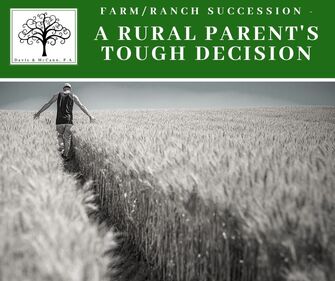 If you grew up in rural America, it’s a pretty safe bet to say you know a farm or ranch family who experienced a bitter argument after the parents passed away while the farm/ranch assets were being divided. Perhaps you were even one of the unfortunate family members caught up in the turmoil because Mom and Dad never found time to do estate planning, or just couldn’t decide on a method to transition the farm/ranch operation to the next generation. If you own a farm or ranch, would like to keep the operation in your family for future generations, AND desire to preserve family relationships, now is the time to form a solid succession plan. A good succession plan takes time and isn’t without emotion and compromise, but the result can provide a future for your family and ensure your operation transfers to the next generation with as few problems as possible. Succession planning is a complex matter but here is a brief synopsis of three common succession options we see: 1. Farming heir purchases farm assets from parents as they reach retirement age. The proceeds are incorporated into the parents’ estate, with the intent to share those proceeds with the children upon their death. Drawbacks to this approach may include the requirement that the farming heir have access to large amounts of money or credit to complete the purchase. (Too much debt may financially cripple the farming heir if he/she does not have adequate collateral prior to the sale.) Also, the parents’ will have capital gains tax on the proceeds from the sale. Both of these could be lessened by the parents financing the sale. Keep in mind that should one or both of the parents require multiple years of nursing home care, some or all of this income could be required for their care, leaving little to nothing for their heirs after death. 2. Farming heir purchases farm assets from estate after both parents pass. The drawbacks to this option are very similar to the first option. The farming heir must have access to large sums of money or credit and if the parents required extended nursing home care and received Medicaid, the heirs may be required to sell farm property at public auction to pay Medicaid debt. The upside here is that since the assets would have received a step-up in basis at the parents’ death, the selling heirs will not have to pay capital gains tax. 3. Parents form a limited liability company (LLC). Forming an LLC is a popular option to achieve longevity of the family farm and equity among farming and non-farming children. By placing the land in an LLC, the property is kept together. The parents can retain full ownership of the LLC during their lifetime, or they can choose to gift/sell the children individual units (shares) of the LLC during their lifetime. The most common scenario we see allows the farming heir to rent (or crop-share) the farmland from the other heirs for his/her lifetime or another specific time period. The parents retain management control during their lifetimes, then appoint a farm manager (usually the farming heir) to succeed them upon retirement, grave illness, or death. The process to establish rental or crop-share rates and terms are pre-determined, which helps eliminate surprises and family discord. The parents can still face exposure to higher estate taxes and potential nursing home liens, but the LLC option provides a method to pass the farm operation to the farming heir, while still providing for the needs of the non-farming children and eliminating many of the possible reasons for family arguments. If the parents desire to decrease the risk of excessive estate taxes and potential nursing home liens on their estate, there are multiple estate planning and long-term care planning techniques they can use to achieve that goal. Check with an experienced estate planning attorney who also is well-versed in long-term care planning, to discuss those options. Regardless which plan farm/ranch families utilize, the most important issue is that they develop a detailed, formal program to outline the terms of operation transition, and if at all possible, minimize taxation issues for the parents and children. For more information on these or other farm/ranch succession planning or estate planning, contact Davis & McCann, P. A., Dodge City, KS. We are members of Wealth Counsel, a national consortium of Estate Planning Attorneys and the National Academy of Elder Law Attorneys (NAELA). We focus our practice on providing clients with the best legal advice on Estate Planning, Medicaid and Long-term Care Planning, Family Business/Small Business Succession Planning, Probate, Trust Administration, Real Estate Transactions, 1031 Exchanges and related matters. Comments are closed.
|
NEWS YOU CAN USEDavis & McCann, P. A., Archives
April 2021
Categories
All
|

 RSS Feed
RSS Feed